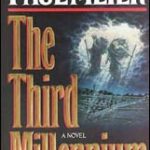For Writers: The Spiritual Element
[“The Spiritual Element” is a reprise of a guest article by Sarah Sawyer featured here in July 2011, and which remains as pertinent and relevant today as it was then. ~ RLM]
_____X X X X X_____
I read with interest a recent conversation on the Enchanted Inkpot regarding religion in fantasy novels. Most of the participants in the discussion were not Christians, therefore their responses gave a broader view than often seen in these sorts of faith in fantasy discussions. Several points in particular were relevant to Christian writers of speculative fiction, which I’ll recap here for conversation purposes.
The article offered an even-handed portrayal of religion in fantasy novels and the reasons you may or may not want to include it.
Possible advantages:
- Enhance richness of setting
- Add tension to plot
- Flesh out motivations of a character
Possible disadvantages:
- May not be relevant to a particular story
- May cause controversy
- May be prevented by the author’s personal beliefs
But in the comments, things really became interesting. Several common threads cropped up:
- People enjoy creating and reading about fictional religions (often ones that blend elements of real world faiths and mythologies)
- Some have had negative experiences with religious expression in speculative fiction, namely with preachiness (specifically mentioned in connection with Christianity), Christian themes, or the portrayal of monotheistic religions as uniformly bad.
Despite the variety of opinions shared and the distaste of some for Christian themes, almost every commenter placed a value on faith and its inclusion in fantasy tales. Why? Because everyone believes something about the supernatural. That’s equally true of individuals in an invented fantasy world or a far-future civilization as it is of people in our own world. Neglecting the spiritual element doesn’t enhance the realism or decrease the preachiness of the story, rather it leaves out a significant component that shapes the attitudes and actions of characters in a given culture — and indeed, shapes the world itself.
 In a discussion of imagination and world creation, CS Lewis aptly stated that “no merely physical strangeness or merely spatial distance will realize that idea of otherness which we are always trying to grasp in a story about voyaging through space: you must go into another dimension. To construct plausible and moving ‘other worlds’ you must draw on the only real ‘other world’ we know, that of the spirit.”
In a discussion of imagination and world creation, CS Lewis aptly stated that “no merely physical strangeness or merely spatial distance will realize that idea of otherness which we are always trying to grasp in a story about voyaging through space: you must go into another dimension. To construct plausible and moving ‘other worlds’ you must draw on the only real ‘other world’ we know, that of the spirit.”
So whether it’s overt or subtle, there has to be reflection of something greater for a story to resonate as true. It may take the form of direct allegorical elements or a subtle symbolic thread, but in capturing some element of spiritual truth, our stories will gain impact.
Yes, Christian writers face prejudice at times. There’s an interpretation (sometimes rightfully so) of Christian works as preachy, and there certainly seems to be a more favorable view toward the depiction of fictional faiths that spring from no greater reality than the mind of their inventor, fusing together bits and pieces of mythology, legend, and obscure spiritual beliefs.
Yet rather than taking this to mean any hint of our worldview should be expunged from our works, I take it as a challenge to craft something so compelling that even those that might normally be repelled by any Christian element would want to read it. To truly engage readers, we must craft the spiritual elements of our stories with as much care as plot and character.
We may end up with stories like Tolkien’s that only reveal a spiritual framework when viewed as a whole or tales like Lewis’s that contain more obvious suppositions. Either way, the faith element should dynamically connect with the story in a way that enriches setting, enhances character, and strengthens plot, a seamless fusion without which the story would fail to function. Can you imagine Middle Earth without Gandalf? Or Narnia without Aslan? The spiritual underpinnings of these books make the stories function at their highest and best…and that’s what we should all aspire to achieve.
_____X X X X X_____
 Sarah Sawyer loves creating other worlds and exploring what they can reveal about our own. Her passion for story led naturally to novel writing, and her love of the imaginative to fantasy.
Sarah Sawyer loves creating other worlds and exploring what they can reveal about our own. Her passion for story led naturally to novel writing, and her love of the imaginative to fantasy.
Sarah has served as a Carol Awards judge and a book reviewer, and she works to promote Christian speculative fiction wherever she can.









































Our society has a lot of work to do in regards to figuring out how people of different religions, etc. can get along, so taking the religious element out of stories would remove an excellent way of figuring out religious issues in real life.
There’s a few ways that writers(especially Christian ones) can improve the religious element. One is to adapt the religion to the story world. Of course the basic tenants should be there, but they need to make sense and be a natural part of the world. In some of my Christian fiction stories, for instance, nothing resembling a Bible exists, or at least the characters don’t know it exists. That is because circumstances were such that a Biblical text was never brought to them. That could mirror a real life circumstance where people are told about the gospel, but the one that told them about the gospel didn’t have a Bible on hand, or their copy of the Bible was lost or stolen, forcing them to adapt accordingly.
Also, writing fairly from the perspective of characters with different beliefs on spirituality is important. One of my stories, for instance, has a Christian artist that’s friends with an atheist scientist. They both get detailed and important POV sections in their story. In fact, the atheist is the main character in one of the later books in the series. This can make a story feel fleshed out, real, and fair, if done right.